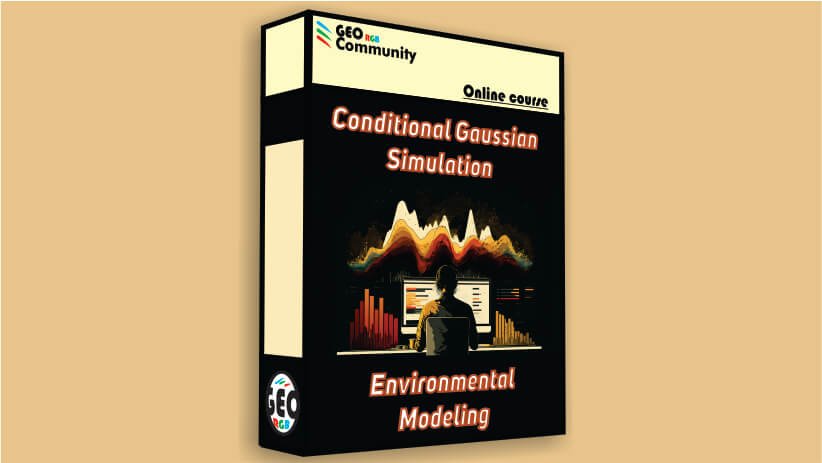
About Course
Conditional Gaussian Simulation
Introduction:
First and foremost, welcome to the “Conditional Gaussian Simulation” course, an essential part of the geostatistics course series offered by the geoRGB Community since early 2021. Throughout this course, you will gain a comprehensive understanding of the practical applications of conditional Gaussian simulation using R and QGIS software. Additionally, you will learn the benefits of employing this method over kriging interpolation in specific scenarios.
Objectives:
This Conditional Gaussian Simulation course aims to provide a comprehensive understanding of geostatistical principles and their practical applications. Learners will master data standardization through Gaussian Anamorphosis, Simple Kriging interpolation techniques, and the advantages of conditional simulation over traditional estimation methods. The course offers hands-on experience with R and QGIS software for geostatistical analysis and guides participants through real-world exercises to enhance their expertise. The supportive learning environment encourages collaboration and knowledge exchange among participants, preparing them to apply these skills in various fields and contribute to the advancement of geostatistics.
Lessons:
This course provides essential lessons for environmental projects and decision-making processes, covering six key topics:
- Gaussian Anamorphosis: A data transformation technique for standardizing datasets into a Gaussian distribution, improving the accuracy and reliability of Conditional Gaussian Simulations.
- Simple Kriging: A fundamental geostatistical interpolation method for spatial prediction and reversing Gaussian Anamorphosis, crucial for generating accurate and reliable spatial models.
- Conditional Simulation Advantages: The benefits of using conditional simulation in geostatistics, including capturing uncertainty and providing a comprehensive representation of spatial data.
- Soil Contamination Probability Maps: Using conditional Gaussian simulation to create maps displaying soil contamination probability, aiding environmental professionals in site management.
- Evaluating Soil Remediation Costs: Estimating costs associated with soil remediation projects using conditional simulation, leading to more informed resource allocation and remediation strategy selection.
- Assessing Groundwater Well Installation Uncertainty involves two steps. Firstly, conditional Gaussian simulation is utilized to assess water table level uncertainty during well installation. This ultimately minimizes risks and optimizes well placement.
The six lessons included provide a strong foundation in Conditional Gaussian Simulation. Upon completion, you will possess the necessary skills to effectively address various geostatistical challenges. Join us at https://giscourse.online/ for geostatistical mastery.
Course requesites:
Prior to starting the Conditional Gaussian Simulation course, it is highly recommended to complete the previous courses offered by the GeoRGB Community and have basic knowledge in GIS.Completing the prerequisite courses, along with having a basic understanding of GIS concepts and spatial data handling, is necessary. This background and skill set will enable you to successfully navigate the complex topics covered in the current course.
- First course: Geostatistics Course for Beginners – Creating Algorithms with R for QGIS Link: https://giscourse.online/courses/geostatistics-course-for-beginners-creating-algorithms-with-r-for-qgis/
- Second course: Bivariate Analysis with R and QGIS Link: https://giscourse.online/courses/second-geostatistics-course-bivariate-analysis-with-r-and-qgis/
- Third course: Structural Analysis for Kriging & Cokriging Link: https://giscourse.online/courses/third-geostatistics-course-structural-analysis-for-kriging-cokriging/
- Fourth course: Interpolation and Mapping of Kriging & Cokriging Link: https://giscourse.online/courses/4th-geostatistics-course-interpolation-and-mapping-of-kriging-cokriging/
Completing the prerequisite courses and having a basic understanding of GIS is crucial. This will provide you with a comprehensive understanding of the core concepts and techniques in geostatistics, preparing you for success in the Conditional Gaussian Simulation course.
Course achievements
Upon successful completion of the Conditional Gaussian Simulation course, you will have achieved the following:
- A comprehensive understanding of conditional Gaussian simulation principles and their practical applications in geostatistics.
- Proficiency in data standardization through Gaussian Anamorphosis and Simple Kriging interpolation techniques.
- The ability to leverage conditional simulation to capture uncertainty and provide a more comprehensive representation of spatial data.
- Hands-on experience using R and QGIS software for geostatistical analysis and spatial modeling.
- Being equipped with the skills to apply geostatistical techniques to real-world problems is essential. These skills can be used for tasks such as soil contamination probability mapping, soil remediation cost evaluation, and assessing the uncertainty of groundwater well installations.
- Enhanced decision-making and resource allocation abilities in environmental projects through the quantification and management of uncertainty.
- Having a strong foundation in geostatistical concepts and tools is key. This foundation can be applied across various industries, such as geology, hydrogeology, mining, and remediation.
- Having confidence in your geostatistical expertise is crucial. This confidence allows you to clearly convey your findings and play a role in the progression of geostatistics and related fields.
- A valuable addition to your professional or academic credentials, demonstrating your commitment to continuous learning and expertise in geostatistics.
- Interaction with fellow learners, instructors, and experts in the field of geostatistics fosters an expanded professional network. This, in turn, facilitates collaboration and knowledge exchange.
Course recommendation
Explore recommended courses and tutorials for enhanced geostatistics understanding and QGIS experience. By doing so, you can expand your knowledge and expertise in the field. These resources will complement your learning in the Conditional Gaussian Simulation course, providing you with a well-rounded foundation in geostatistics:
- Geostatistical Analysis Course: Kriging Interpolation & Groundwater Flow Map Link: https://giscourse.online/courses/geostatistical-analysis-course-kriging-interpolation-groundwater-flow-map/
- QGIS Tutorial: Download and georeference Google Earth images in QGIS 3.1 with Quickmap Service Plugin. Link: https://youtu.be/CaPzOJk4Dd4
- QGIS Tutorial: QGIS CAD tools for editing. Link: https://youtu.be/LaVaGGcgO0w
- QGIS Tutorial: How to create a map using QGIS for beginners. Link: https://youtu.be/g-i1-pu195g
By engaging with these additional resources, you’ll deepen your knowledge and skills in geostatistics and QGIS. Consequently, This enhances your career prospects by expanding your spatial analysis capabilities.
Course Content
Lesson 0
-
Introduction to the Conditional Gaussian Simulation Course
04:47
Lesson 1
Lesson 2
Lesson 3
Lesson 4
Lesson 5
Lesson 6
Student Ratings & Reviews


